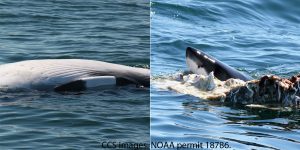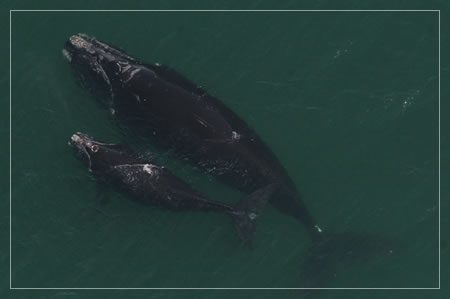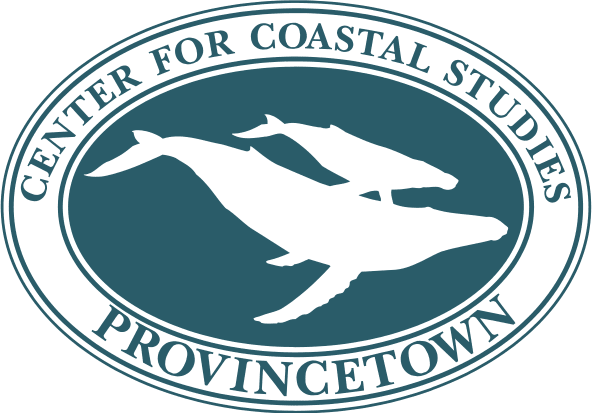August 5, 2016.
Video below.
For the past three days, CCS researchers have been monitoring the carcass of a small minke whale in Cape Cod Bay off North Truro. Data collected during these 72 hours shows that there is as much to be learned from the whales in death as in life.

The carcass was reported to the Center on Wednesday morning. Once on scene they found an 11-foot long, female minke whale floating belly up. The carcass was intact and in good condition, indicating the whale had not been dead for long. There were no outward signs of the cause of death and samples were collected before leaving the carcass.
On Thursday the carcass was again reported, not far from where it was seen a little more than 24 hours before. The team responded and found the carcass in radically different condition. At least two white sharks were attending the whale and had removed the tongue, internal organs and most of the muscle. The carcass was still floating but was essentially little more than the spinal column and skull. The team left the carcass and alerted town and State officials.
On Friday morning, the remains of a small whale washed up on Beach Point in North Truro, likely of the same whale.
Scott Landry, Director of the Marine Animal Entanglement Response team at the Center, explained that, while the vast majority of cetacean research focuses on live whales, it is equally as important to study deceased individuals.
“Had we not had the opportunity to closely examine this whale over the last 48 hours and witness firsthand the rapid deterioration of the carcass, we might have assumed that these reports represented separate individuals” Landry explained. ”How carcasses change over time is helpful in understanding the likelihood of discovering whale carcasses at sea and how this relates to our understanding of populations.”
Members of the public are reminded to exercise caution if they find remains similar to these in the water, as they represent a significant food source for large predators including several shark species. Such sightings should be reported immediately to the US Coast Guard on VHS 16 or to response teams like the Marine Animal Entanglement Hotline at 1-800-900-3622.
CCS disentanglement work is supported by a grant from the National Marine Fisheries Service (NMFS) and the Massachusetts Division of Marine Fisheries (MA-DMF). Support for the Marine Animal Response Team also comes from grants from the Massachusetts Environmental Trust, the Pegasus Foundation, the Hermann Foundation, the Mary P. Dolciani Halloran Foundation, the G. Unger Vetlesen Foundation, the Grace W. Allsop Foundation, the MALLRD Foundation, and contributions from CCS members. All disentanglement activities are conducted under a federal permit authorized by NOAA.

Our Work
Humpback Whale Research
Right Whale Research
Marine Animal Entanglement Response
Marine Geology Department
Water Quality Monitoring Program
Marine Fisheries Research
Seal Research
Shark Research
Marine Education
Interdisciplinary
Marine Debris and Plastics Program
Marine Policy Initiative
Cape Cod Climate Change Collaborative
Publications

